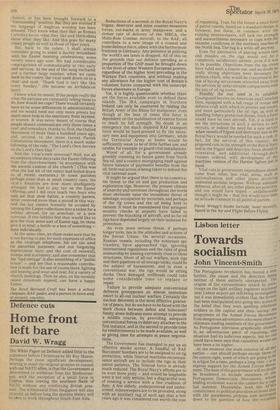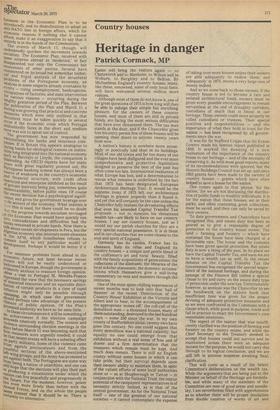Lisbon letter
Towards socialism
John Vincent-Smith
The Portuguese revolution has moved a steP further, the cause and the direction being neither of them entirely unexpected. The, origins of the extraordinary attack by Para,; troops on the light artillery regiment stationeu, near Lisbon airport are still being investigated, but it was immediately evident that the former had been manipulated into going into action M the belief that they were quelling rebellious soldiers in the capital and thus 'saving' the programme of the Armed Forces Movement from dangerous adventurers who were about t0 eliminate leading members of the government. As Portuguese television graphically showed in an adventurous piece of reporting, this situation had its ludicrous aspects, but no one could have been sure that casualties would not have been a lot higher. At the moment the main concern of all the parties — one should perhaps except those ni the centre-right, some of which are going to be in eclipse for a time, perhaps a long time — 15 t° express support for the Armed Forces Move" ment. The base of the government will no doubt be broadened to include members Of the Portuguese Democratic Movement, whase leading economist was in the cabinet for a time last summer. Meanwhile, both the AF commitment to political pluralism at home (bit; with the parameters perhaps now narrowed down to the question of how the socialism foreseen in the Economic Plan is to be introduced), and its disinclination to adopt an anti-NATO line in foreign affairs, which for economic reasons if nothing else it cannot afford, make it an exaggeration to say that it entirely is in the hands of the Communists. The events of March 11, though, will undoubtedly quicken the movement towards socialism. The Economic Plan, received with so me sdrprise abroad as 'moderate,' in fact disappointed not only the Communists but economists of other parties. Several have commented on its broad but somewhat technical and frigid analysis of the structural Problems of the Portuguese economy, an analysis in some respects already overtaken by events rising unemployment, bankruptcies, Occupations of factories, and state intervention for various reasons occurring during the lengthy gestation period of the Plan. Between the publication of the Plan and March 11 a feeling was growing that practical and concrete measures which were only outlined in that document must be taken quickly in several areas if the economic crisis which Portugal undoubtedly faces in the short and medium term was not to spiral out of control. The government has now responded by nationalising the banks and insurance companies. If in Britain this appears analogous to la. Ying hands for ideological reasons on institutions long integrated into the national economy such as Barclays or Lloyds, the comparison is misleading. As OECD reports have for many Years with great regularity pointed out, the Portuguese banking system has always been a source of weakness in the country's economic and financial structure, with credit often restricted and enterprise inhibited as the result of private interests being put, sometimes quite understandably, before public ones. Of course the recent decision has a psychological significance, and gives the government leverage over vide sectors of the economy. What matters is ' this is used, for there could be no doubt that the progress towards socialism envisaged. i.n the Economic Plan would have quickly run. !nto contradictions and difficulties had the i banks remained in private hands. Now there s talk about recent developments in Peru, but the lgerian economy also interests some elements 'II the AFM, which nonetheless refuses to commit itself to any particular model of i
d.
eveiopment. Perhaps it would be better if t di For immense problems loom ahead in the economic future, not least because recent events will not be easily understood or weloomed in Europe, though the government is evidently anxious to reassure foreign opinion. After a visit to Portugal M. Mendes-France e%pressed the view that the necessary savings imported resources and an equitable distriputton of certain products in a time of rapid 'nflation might only be possible through rptioning, in which case the government should perhaps take advantage of the present climate of public opinion. Of the Plan's Promised austerity we have so far seen little. In these circumstances it will be something of an achievement if the election campaign Proceeds relatively normally. The tension and violence surrounding election meetings in the days before March 11 was becoming such that firm measures were urgently needed; it could i(,e that recent events will have a sobering effect frrifsParty militants. Some of this violence came -In agents provocateurs and from the Youthful sections of the above-mentioned lett-wing groups, and the Army has promised to act against both. The Portuguese are some way from being a nation of anarchists, and one can till hope ili hope that the elections will play their part !n producing a constitution under which the nation can live peacefully and progressively in lne future. For the moment, however, power Iles even more firmly than before with the Armed Forces, and on the whole the people, __ enl content that it should be so. There is certainly no alternative.



































 Previous page
Previous page